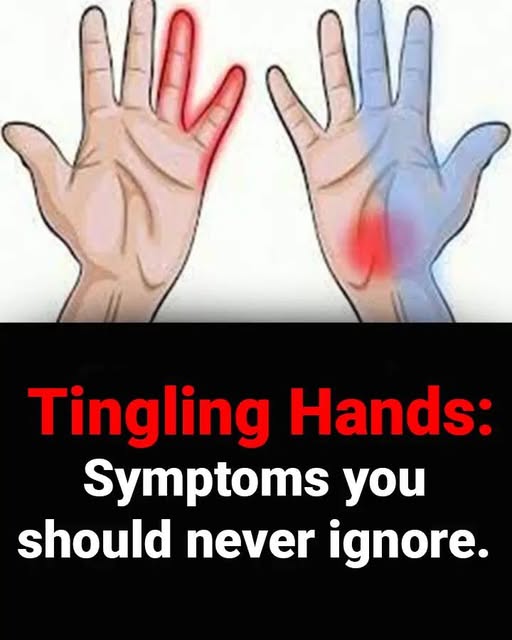
Experiencing tingling in your hands can be both uncomfortable and concerning. This sensation, often described as “pins and needles,” can result from various factors, ranging from temporary issues like poor posture to more serious medical conditions. Recognizing the underlying causes is essential for effective treatment and prevention.
Common Causes of Tingling Hands
-
Restricted Circulation: Temporary compression of blood vessels, such as sleeping with your arm under your head or prolonged pressure on your hands, can lead to tingling. Typically, this sensation resolves once normal blood flow is restored.
-
Diabetic Neuropathy: Chronic high blood sugar levels in individuals with diabetes can damage nerves, especially in the extremities, causing tingling, numbness, and sometimes pain. Managing blood sugar levels is crucial in mitigating these symptoms.
-
Vitamin Deficiencies: Lacking essential vitamins like B1, B6, B12, and folic acid can impair nerve health, leading to tingling sensations. A balanced diet or appropriate supplementation can address these deficiencies.
-
Pinched Nerve: Nerve compression from repetitive motions, poor posture, or injuries can cause tingling. Conditions like carpal tunnel syndrome, where the median nerve is compressed at the wrist, exemplify this issue. Treatment may involve rest, ergonomic adjustments, or surgery in severe cases.
-
Kidney Failure: Impaired kidney function can lead to toxin accumulation in the body, resulting in nerve damage and tingling sensations. Additional symptoms include fatigue, changes in urination, and swelling. Immediate medical intervention is necessary.
-
Pregnancy: Fluid retention and swelling during pregnancy can exert pressure on nerves in the wrists and hands, causing tingling. While often temporary, persistent symptoms should be discussed with a healthcare provider.
-
Medications: Certain drugs, such as chemotherapy agents and specific antivirals, can have nerve-damaging side effects, leading to tingling. Consulting a healthcare provider about adjusting the medication may be beneficial.
-
Infections: Viruses and bacteria, including Lyme disease, HIV, and COVID-19, can inflame nerves, resulting in tingling sensations. Prompt medical attention is advised if an infection is suspected.
-
Autoimmune Disorders: Conditions like lupus, rheumatoid arthritis, and multiple sclerosis involve the immune system attacking healthy tissues, including nerves, which can cause tingling.
-
Stress and Anxiety: Emotional stress can trigger brief episodes of tingling, often due to hyperventilation or muscle tension.
When to Seek Medical Attention
While occasional tingling due to temporary factors like posture is common, persistent or unexplained sensations warrant professional evaluation. Consult a healthcare provider if tingling:
-
Persists or worsens over time
-
Is accompanied by other symptoms such as pain, weakness, or numbness
-
Interferes with daily activities
Treatment and Prevention Strategies
Addressing the root cause is vital for effective treatment. Depending on the diagnosis, strategies may include:
-
Lifestyle Modifications: Improving posture, taking regular breaks during repetitive tasks, and ensuring ergonomic work environments can alleviate symptoms.
-
Medical Management: For conditions like diabetic neuropathy or vitamin deficiencies, managing blood sugar levels and correcting nutritional gaps are essential.
-
Physical Therapy: Exercises to strengthen and stretch affected areas can relieve nerve compression.
-
Medications: Pain relievers, anti-inflammatory drugs, or medications targeting nerve pain may be prescribed.
-
Surgical Intervention: In cases like severe carpal tunnel syndrome, surgery might be necessary to relieve nerve pressure.
Preventative Measures
To reduce the risk of developing tingling sensations in the hands:
-
Maintain a Balanced Diet: Ensure adequate intake of essential vitamins to support nerve health.
-
Exercise Regularly: Engage in physical activities that promote good circulation and overall health.
-
Practice Good Posture: Proper posture minimizes nerve compression risks.
-
Manage Chronic Conditions: Effectively controlling diseases like diabetes can prevent complications such as neuropathy.
-
Limit Repetitive Motions: Take breaks and use ergonomic tools to reduce strain during repetitive tasks.
By understanding the potential causes and implementing appropriate measures, you can effectively manage and prevent tingling sensations in your hands, ensuring better nerve health and overall well-being.





